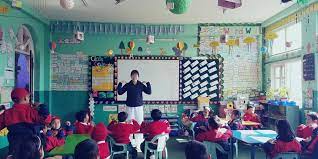
Confucius Institute brings better life to Nepalis
What benefits can an average Nepali get from learning Mandarin? More profits, a better life and a brighter future, according to Dipak Shakya, 33, a Buddhist statues and sculptures manufacturer and supplier in Patan (Lalitpur), a well-known manufacture base and distribution center of Buddhist related commodities in Kathmandu Valley.
About half a decade ago, as tourists from neighboring China began to troop to the famous Patan Dubar Square and other narrow streets in this city, Dipak enrolled in Chinese classes at the Confucius Institute at Kathmandu University (CIKU), which was co-established by Kathmandu University and China’s Hebei University of Economics & Business on June 13, 2007.
Among the first batch of students of CIKU, Dipak has been studying there for nearly five years. Now that he can fluently speak Mandarin, he sells figures of Buddha by wholesale to about 100 businessmen from Tibet, Sichuan, China’s Taiwan and other regions, earning a gross income of 20,000 Nepali rupees (about 2,353 U.S. dollars) every month.
Two other proprietors, Ramesh Ratra Shakya, 38, and Majin Shakya, 34, also told Xinhua that since 80 percent of their buyers are from China, learning Mandarin has greatly helped them gain a considerable advantage in Patan where it is estimated that some 50 percent of the residents are engaged in the manufacture and sale of statues.
Dipak recently hired an apprentice, Harry Shakya, a 27-year-old young man who used to be a driver. Shakya is now learning Mandarin along with Dipak at the Confucius Institute.
The Confucius Institute, which is non-profit, has now a branch in Patan with several classrooms and many teaching points scattered in other important cities out of Kathmandu Valley, including the one in Lumbini, the birthplace of Lord Buddha, and Pokhara, “Nepal’s tourism capital.”
The interest to learn Mandarin has gone up sharply especially in 2012, which was designated as “China-Nepal Friendly Exchanges Year” after the visit to Nepal of Chinese Premier Wen Jiabao in January this year.
For the past five years, some 1,000 students have studied Mandarin, mostly peddlers, merchants and tour guides.
In February, the Confucius Institute opened a high-level class at Thamel, a prosperous downtown area in Kathmandu where students were mostly bank executives.
The main mission of the Confucius Institute, which has branches in more than 100 countries around the world, is to facilitate cultural exchanges and create opportunities for collaboration among peoples, particularly those interested in the Chinese language and culture.
(This article was released by Xinhua on June 14, 2012.)


